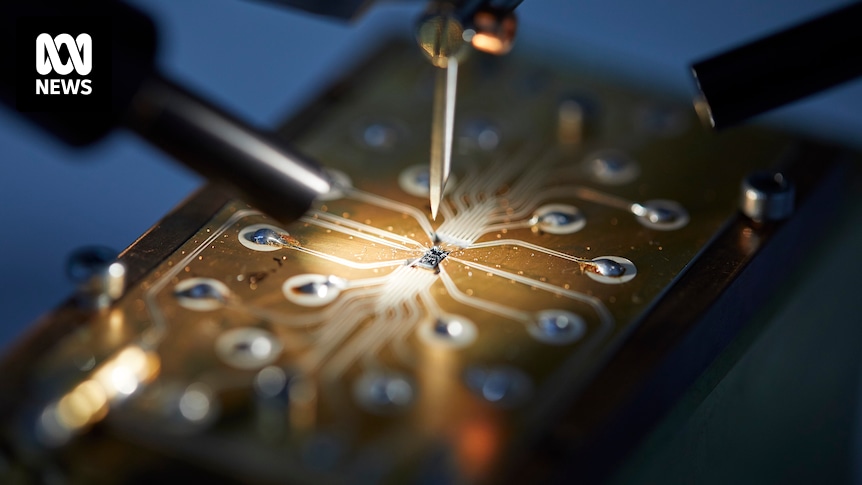Australia signs deal worth almost $1b with PsiQuantum to build world’s first ‘useful’ quantum computer
Australia will invest almost a billion dollars in a bid to build the world’s first commercially useful quantum computer in Brisbane.
The Queensland and Australian governments have set aside $470 million each in grants, loans and share purchases for the company PsiQuantum.
PsiQuantum will attempt to build the world’s first large “fault-tolerant” quantum computer, free from the errors and instabilities that render other quantum computers impractical.
The company said this would be the world’s first “useful” quantum computer, capable of being used in industry, research and defence without significant errors.
Australia’s Chief Scientist Cathy Foley told ABC Radio Brisbane quantum computers would soon be a part of everyone’s everyday life.
“It’s going to be the most complex machine ever built by humanity,” Dr Foley said.
“Quantum computing is going to revolutionise computing power because it can use different principles of physics that we previously couldn’t access,” she said.
“We’ll be able to solve complex problems that we just can’t do — even very basic ones like how to work out the best route for trucking or organising ports and even high school timetables.”
She said the Queensland government had set aside $5 million to research how quantum computing could help organise the logistics of the 2032 Brisbane Olympics.
PsiQuantum was co-founded by two Australian University of Queensland graduates, Jeremy O’Brien and Terry Rudolph, in America’s Silicon Valley.
As part of the deal, the company will relocate to Brisbane, where it will build its warehouse-sized supercooled quantum computer.
Dr Foley said the Australian scientific community was “very excited” to see Australian governments invested in developing its technology within its borders.
She said Australian scientists wanted to avoid a repeat of what happened with photovoltaic cells, which were invented at the University of NSW but then exported and commercialised in China.
University of Queensland Professor Andrew White said the first breakthroughs in quantum mechanics were made by Brisbane researchers at least 20 years ago.
Professor White said the new quantum computer will have immediate uses in industry and scientific research.
But in the next 30 to 40 years, the technology will become more widely available and “change everything”, much like the personal computer did, he said.
Professor White says quantum computers use the principles of nature to perform many more calculations than a classical computer is capable of doing.
He said quantum computers harnessed the “weird” power of quantum mechanics to solve problems that were too complex for any classical computer.
“In quantum mechanics, things can genuinely be in two places at once — we call that superposition,” Professor White said.
“There’s a thing called entanglement where quantum systems correlate with each other and it looks like nature’s cheating.
“So what we’re trying to do with quantum computers is hack nature, do the stuff that she’s doing all the time and use it to our advantage.”
Federal Minister for Industry and Science Ed Husic said the government did not wish to repeat the mistakes of the past by allowing this technology to go overseas.
He said Australia’s historical failures to support a local chip manufacturing industry had meant those industries had moved to Asia.
“[PsiQuantum] left our shores because they didn’t think that we’d had an interest or a desire to back this type of technology,” Mr Husic said.
“Now these Australians want to come home to ensure that we can become a tech manufacturing powerhouse.”
Prime Minister Anthony Albanese said the government wanted Australia to become a centre for quantum growth for the rest of the planet.
“We are proud to be working with the Queensland government to make visionary investments in the future of our nation,” he said.
“This investment shows we are serious about building a strong quantum ecosystem here in Australia.”
PsiQuantum’s Terry Rudolph told ABC Radio Brisbane that Queensland researchers had been uncovering the physics behind quantum computing over the last 25 years.
However, Professor Rudolph said that it was only since 2015 that the practical engineering problems began to seem solvable.
He said the company was confident that Queensland had the expertise in engineering, manufacturing, science, and technology to pull it off.
“There’s many problems we know that, even if we turned all the silicon in the solar system into a classical computer, we would never be able to solve those problems,” he said.
“The cool thing is for some of those same problems we know we would never solve with a classical computer, the total number of steps it’s going to take on a quantum computer is vastly less.”
Queensland Premier Steven Miles said the state should not lose another opportunity to support a burgeoning industry.
“By being early adopting … we can ensure that industry develops here, and we’re not trying 20 or 30 years later to play catch-up,” he said.
“This is all about adding an additional capacity to our state that will be recognised globally and draw investment to Queensland from right around the world.”
We acknowledge Aboriginal and Torres Strait Islander peoples as the First Australians and Traditional Custodians of the lands where we live, learn, and work.
This service may include material from Agence France-Presse (AFP), APTN, Reuters, AAP, CNN and the BBC World Service which is copyright and cannot be reproduced.
AEST = Australian Eastern Standard Time which is 10 hours ahead of GMT (Greenwich Mean Time)
